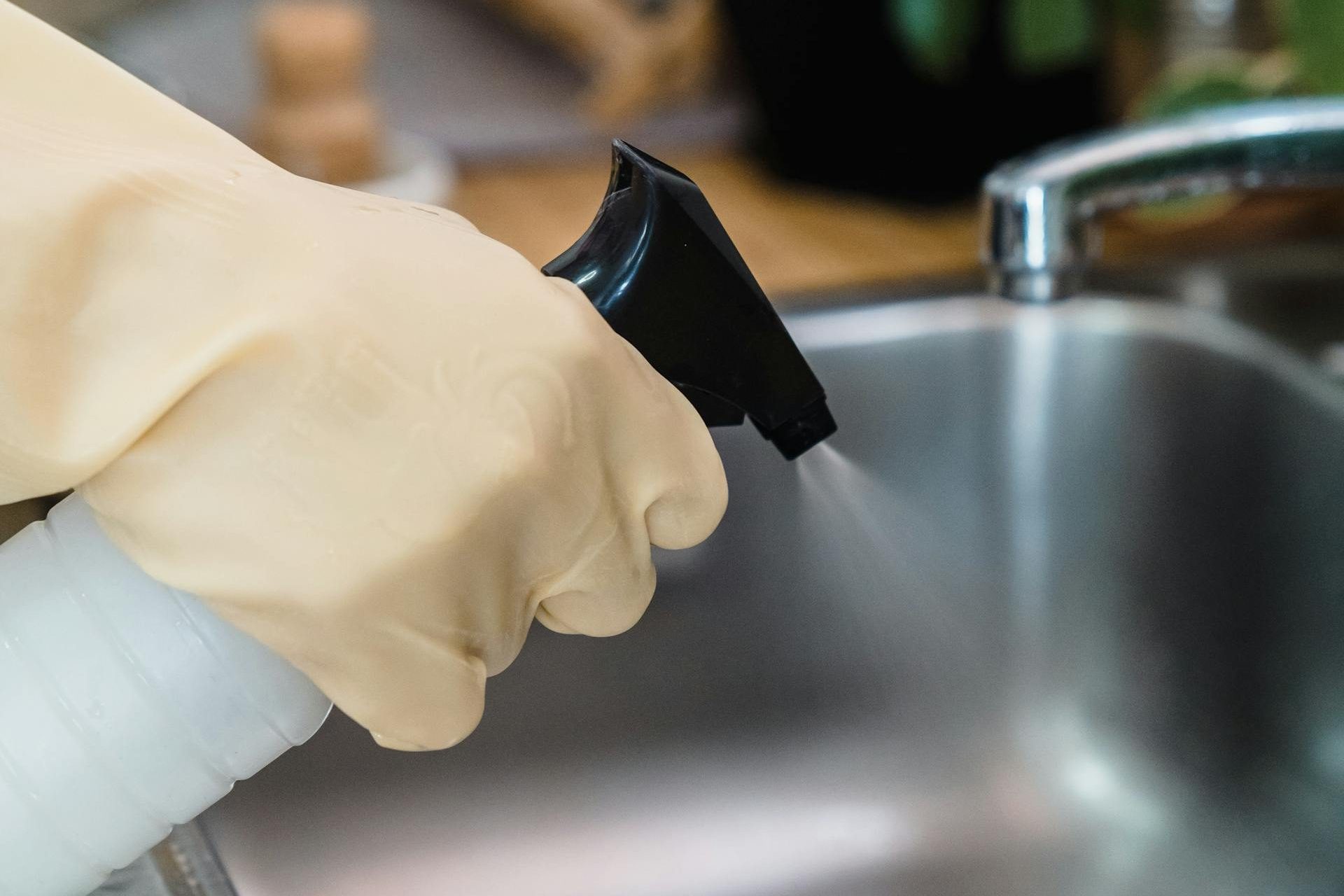In the bustling rhythm of family life, the state of our homes often reflects our inner world. This is where what the Bible says about keeping a clean house and offers some fundamental guidance.
A messy house may reflect the feverish activity inside of children at play. A museum-like spotless house shows a battle to control all parts of their environment. And cluttered or dirty houses could suggest other struggles.
But cleanliness is subjective. What is clean for someone, may not be for another.
As Christians in our daily lives, we want our house health to reflect our spiritual health.
The Bible does not provide direct instructions on housekeeping. But it does offer valuable insights into cleanliness and stewardship (Proverbs 31, Luke 11:24-26, Leviticus 14:48, 2 Kings 20:1). As well as the harmony of a well-ordered life. Understanding these biblical principles can inspire us to maintain our homes as sanctuaries of health, peace, and spiritual well-being.
Let’s learn about:
- Biblical perspective on cleanliness
- Understanding housekeeping as good stewardship
- Practical tips for keeping a clean house
- The spiritual significance of cleanliness
- Benefits of a clean house for family life

Biblical perspective on cleanliness
The Bible is in no way a manual on housekeeping. It subtly weaves the theme of cleanliness and order throughout its teachings.
In Proverbs 31, the Bible depicts a virtuous woman who brings order and well-being to her household. Her diligence and care reflect a deeper spiritual truth – that our physical environments can mirror the state of our hearts and minds.
In the Old Testament, cleanliness was often associated with spiritual purity.1 Leviticus details various laws about cleanliness, symbolizing the importance of being clean before God.2 While these laws are not directly applicable to modern housekeeping, they underscore the value placed on cleanliness and order.3
Such as Leviticus 14:48 describes how to keep a house and its occupants clean from the plague. It says to replaster an infected house to clean it, then check it afterward to make sure the disease did not respread. This is how they knew if the home was safe again to live in.
Jesus’ parable of the swept house in Luke 11:24-26 offers another insight. After a house is made clean of evil, it must be filled with good, lest it becomes home to even worse things. This story, while primarily addressing spiritual matters, can be applied to our homes – emphasizing the importance of not just physical cleanliness but filling our homes with love, peace, and God’s presence.
Similarly, in 2 Kings 20:1, King Hezekiah is instructed to “Put your house in order…” as a part of his spiritual preparation. This directive can be seen as a call to all believers to maintain their physical and spiritual households with equal care. That a disorderly house is not right with God.
Understanding housekeeping as good stewardship
The Seventh-day Adventist Church offers a unique perspective on the concept of cleanliness, tying it closely to stewardship and care for God’s creation. Ellen G. White, a co-founder of the church and advocate for health reform from the 1860s to 1900s, emphasized the importance of cleanliness. She linked it to spiritual and physical health. In her writings, she advocates for a well-ordered, clean environment as a reflection of God’s character and our respect for His creation.4 Hygiene was less advanced during her time and they had common issues affecting people’s health. She recommended9:
- If you neglect cleanliness in your house it can lead to disease growing
- Epidemics can spread through the air in neighborhoods, villages, and cities due to poor cleanliness of the places
- Neat and orderly homes bring peace and happiness to those who live in it
- An attractive clean happy home will help the mental health of those living in it
- Keep where you sleep clean, dirty bedding and household items can make you sick
- Let sunlight into your home for sanitation7 and mental health8
- You don’t need to be rich to be clean and tidy
Adventists view stewardship as encompassing all aspects of life, including our homes. Maintaining a clean and orderly home is seen not just as a practical task, but as a spiritual responsibility. It’s a form of worship, honoring God through care for the environment He instructed us to keep (Genesis 2:15). This holistic approach integrates physical cleanliness with spiritual and environmental stewardship, highlighting that our treatment of our immediate surroundings reflects our relationship with God.
Furthermore, the emphasis on health and hygiene aligns with the biblical principle of treating the body as a temple (1 Corinthians 6:19-20). This extends to maintaining a healthy living environment and recognizing the impact of our surroundings on our physical well-being.
What? know ye not that your body is the temple of the Holy Ghost which is in you, which ye have of God, and ye are not your own?
In practice, this means that keeping a clean house is more than just a chore; it’s a way of living that respects the body, the family, and the world around us as gifts from God. It’s about creating a space where family life can thrive in a healthy, harmonious environment, in line with Christian values and teachings.

Practical tips for keeping a clean house
Maintaining a clean and orderly home is not just a physical activity; it’s a practice that can enrich family life and spiritual well-being.
Here are some practical, yet spiritually aligned tips for keeping your home clean:
1. Start with a Plan
Just as God created the world with intention, approach cleaning and organizing your home with a clear plan. Schedule regular cleaning times and stick to them. Cleanmama.com has a realistic cleaning schedule you can try.
2. Declutter Regularly
In Ecclesiastes 3:6, it’s said there is “a time to keep and a time to throw away.” Regularly evaluate your possessions and keep only what is necessary or meaningful. This not only simplifies cleaning tasks but also reduces the mental clutter. Some people use the rule that if you haven’t used it in a year, maybe you don’t need it anymore. You could give it away, sell it, or throw it out. If you think you may still need it store it, and the next time you declutter if you still haven’t used it and it is not meaningful, reevaluate it again if you still need it.
3. Keep it Clean
It isn’t just about organizing and clutter but sanitation. Create a manageable routine for cleaning all parts of your home. Some parts like the bathroom and kitchen should be cleaned frequently. Other areas should be rotated when you clean them, like changing filters. Usually, you just need to do a daily or weekly regular quick cleanup. But every few months you should consider if you need a deep clean on certain areas. Then rotate your cleaning into your plan with a schedule.
4. Take Care of It
While our throwaway society might seem like the normal easy thing to do, your home and what you own is a blessing and a gift. So, you should take care of it by keeping up on maintenance. Starting with repairs on anything that may cause a health issue. Not only does this make you a good steward by taking care of what you own, it will save you money in the long term.
5. Involve the Family
Cleaning should be a shared responsibility. Teach children the value of cleanliness and stewardship from a young age. Working together not only eases the load but also strengthens family bonds. Teach them how to help others and how to take care of themselves when they have their own home. It will also build your children’s self-confidence if they keep their room nice, as their space. Parents should positively encourage this.
6. Mindful Cleaning
Turn cleaning into a mindful activity. Reflect on the blessings of your home and family as you clean, transforming it into an act of gratitude and worship. Some people use the physical activity involved with cleaning to get stress out, like exercise. But don’t let cleaning become last-minute stressful rushes.
7. Eco-friendly Practices
Honor God’s creation by using environmentally friendly cleaning products and methods. Put emphasis on respecting and caring for the world we live in. But also using more natural cleaning products is safer for your respiratory health and free from toxic VOC chemicals and nauseous fumes.5 6 Sometimes you need stronger cleaners, but natural cleaners can work just as well. Some natural cleaner ingredients are also much more affordable. Vinegar, castile soap, borax, hydrogen peroxide, and baking soda are commonly used to make natural cleaners.
8. Regular Rest
Just as God rested on the sabbath day each week, ensure you have a day of rest in your cleaning schedule. This allows for spiritual renewal and prevents burnout. Take a day to enjoy yourself!
By integrating these practices into your routine, housekeeping becomes more than just a chore; it becomes a meaningful, spiritually fulfilling activity that enhances the health and harmony of your home.
The spiritual significance of cleanliness
Cleanliness holds deep spiritual significance. In the Christian context, the cleanliness of one’s surroundings can be seen as a reflection of the cleanliness of one’s heart and soul. This concept is subtly embedded in various scriptures and theological teachings.
- Reflection of Inner Order: Just as God brought order out of chaos in Genesis, a clean and orderly home can reflect the order and peace we seek in our spiritual lives. It symbolizes our effort to create a harmonious environment, mirroring the orderliness of God’s creation.
- Hospitality and Service: A clean home is welcoming and hospitable, embodying the Christian values of love and service to others. By maintaining a clean environment, we prepare a space where we can comfortably welcome and serve others, following Jesus’ example of humility and hospitality.
- Discipline and Stewardship: Regular housekeeping requires discipline, a virtue highly regarded in Christian teachings. It represents stewardship of our earthly possessions, acknowledging that everything we have is a gift from God and should be treated with care and respect.
- Meditative Practice: Cleaning can be a meditative and reflective practice, offering a time for prayer and contemplation. As we physically clean our homes, we can also seek spiritual cleansing, asking God to purify our hearts and minds.
- Sanctuary for Growth: A clean and peaceful home environment creates a sanctuary for spiritual growth and family bonding. It becomes a place where family members can nurture their faith, strengthen their relationships, and find solace from the outside world.
Understanding the spiritual significance of cleanliness elevates the act of cleaning from a mundane chore to a meaningful, soul-enriching practice. It intertwines the physical act of cleaning with spiritual growth, contributing to a holistic approach to Christian living.

Benefits of a clean house for family life
A clean house offers numerous benefits that go beyond the mere aesthetic appeal. It plays a vital role in promoting a healthy, harmonious, and spiritually nourishing family life. Here are some key benefits:
- Health and Hygiene: A clean house is fundamental for maintaining good health. Regular cleaning reduces the presence of allergens, bacteria, and viruses, thus protecting the family from illnesses. This aligns with the biblical principle of treating our bodies as temples of the Holy Spirit (1 Corinthians 6:19-20).
- Mental Peace and Clarity: An orderly environment can significantly reduce stress and anxiety levels. Clutter and mess can be overwhelming and distracting, while a clean space promotes clarity and peace of mind, allowing for better focus on spiritual practices and family interactions.
- Strengthened Family Bonds: Cleaning together can be an opportunity for family bonding. It teaches children responsibility, teamwork, and the value of taking care of their environment. Sharing chores fosters a sense of belonging and shared purpose.
- Safe Environment for Children: A clean home ensures a safe space for children to play and grow. It minimizes the risks of accidents and creates a nurturing environment for their physical and spiritual development.
- A Haven for Growth and Hospitality: A well-maintained home becomes a haven for family growth and a welcoming place for extending hospitality to others, a key Christian virtue. It reflects the family’s values and sets a foundation for building strong, faith-centered relationships.
Stewardship transcends
In conclusion, keeping a clean house offers profound benefits that encompass physical health, mental well-being, spiritual growth, and family harmony. It’s an act that resonates deeply with Christian values, emphasizing stewardship, care, and respect for the gifts God has given us.
In exploring “What Does the Bible Say About Keeping a Clean House,” we discover that while scripture may not explicitly instruct on household cleanliness, it provides guiding principles that resonate deeply with the concept. Cleanliness and order in our homes mirror the spiritual cleanliness and order we seek in our lives. It’s a reflection of our stewardship, care for God’s creation, and our commitment to providing a nurturing environment for our families. By embracing cleanliness in our homes, we not only create a healthy and harmonious environment but also honor God through our everyday actions and lifestyle choices.
- Joe M. Sprinkle, “The Laws of Clean and Unclean and their Relationship with the Concept of Sacred Space” (Alliance World Fellowship, May 28, 2018), accessed August 25, 2024, https://awf.world/repository/the-laws-of-clean-and-unclean-and-their-relationship-with-the-concept-of-sacred-space/
- Michael Hunt, “THE PENTATEUCH PART III: LEVITICUS, Lesson 6: Chapters 12-14, The Rules Concerning Purification” (Agape Bible Study, 2010), accessed August 25, 2024, https://www.agapebiblestudy.com/Leviticus/Leviticus_Lesson_6.htm
- Leviticus 4:12, 6:11, 7:19; 10:10, 14; 11:36-47; 12:8; 13:13-59; 14:4-57; 15:8, 13, 28; 16:30, 17:15, 20:25; 22:4-7; 23:22
- Ellen G. White, “The Ministry of Healing”, Page 276 (Ellen G. White Estate), https://m.egwwritings.org/ro/book/135.1369#1375
- “Household use of green and homemade cleaning products, wipe application mode, and asthma among French adults from the CONSTANCES cohort” (NIH National Library of Medicine, July 19, 2022), accessed August 25, 2024, https://www.ncbi.nlm.nih.gov/pmc/articles/PMC9545541/
- Moira Lawler, “Are ‘Natural’ Cleaning Products Really Better for Your Health?” (Everyday Health, March 19, 2024), accessed August 25, 2024, https://www.everydayhealth.com/healthy-home/are-natural-cleaning-products-really-better-for-your-health/
- Kimberly Holland, “Want to Kill Dangerous Bacteria? Open Your Blinds” (Healthline, November 28, 2018), accessed August 29, 2024, https://www.healthline.com/health-news/want-to-kill-dangerous-germs-open-your-blinds
- NIH National Library of Medicine, “Association Between Sunlight Exposure and Mental Health” (June 14, 2023), accessed August 29, 2024, https://www.ncbi.nlm.nih.gov/pmc/articles/PMC10277019/
- Letter on Cleanliness, May 5, https://whiteestate.org/devotional/mlt/05_05/, The Adventist Home, Chapter 2—Fundamentals of True Homemaking, https://m.egwwritings.org/en/book/128.71, Christian Temperance and Bible Hygiene, Chapter 17—Cleanliness an Aid to Purity, https://m.egwwritings.org/en/book/14.663




Leave a Reply